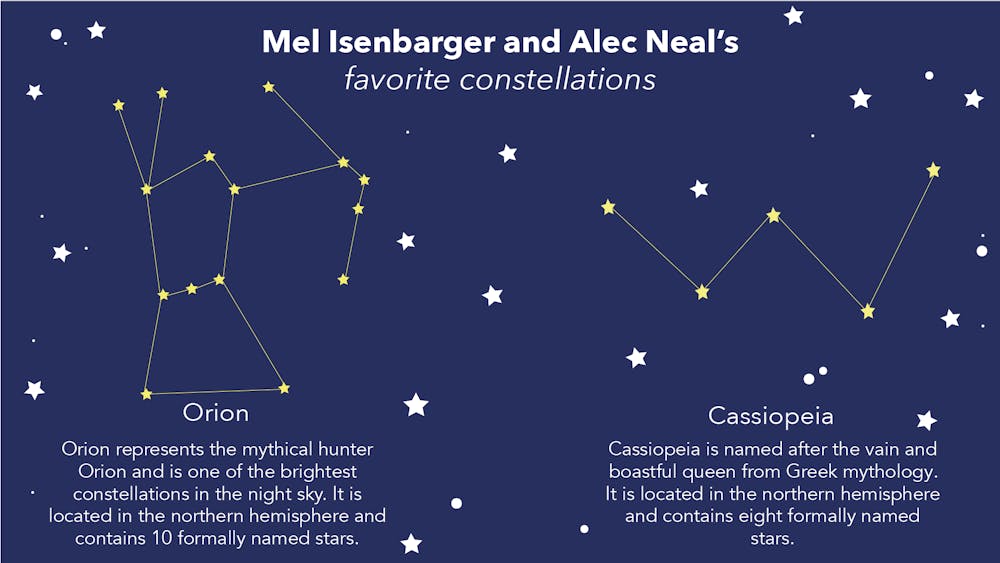Watch the Charles W. Brown Planetarium's Constellation Crew explore new constellations Fridays at 6:30 p.m. on the planetarium's Facebook page.
For Mel Isenbarger, a senior physics and astronomy major, one of the first constellations she learned to locate and identity was Cassiopeia. It remains her favorite constellation, she said, because it reminds her of late-night summertime bonfires and watching meteor showers with her family.
Physics graduate student Alec Neal’s passion for the stars and planets began when he received a telescope as a child. His favorite constellation is Orion, he said, because it's so easy to spot in the sky as three bright stars —Alnitak, Alnilam and Mintaka — comprise Orion’s belt.
Now, Isenbarger, Neal and three other Department of Astronomy and Physics students share their interest in astronomy with the Muncie community as members of the Charles W. Brown Planetarium's Constellation Crew. Every Friday through Facebook Live, the Constellation Crew explores a new constellation.
“Since being closed to in-person shows in March, we really wanted to make sure we were still connecting with the community and putting out quality, informative content,” Isenbarger said. “We wanted to do something a little more informal and fun to make a more personal connection with the community, which I think is really important for everyone in this time.”
During each Facebook Live, the Constellation Crew teaches viewers what each constellation looks like, how to find it in the night sky and the historical stories, symbols or meanings behind the name of each one. Neal said they use the software program OBS Studio to pair the Zoom footage with the planetarium’s computers to show simulations of the constellations.
“[Astronomy] rules our lives with the concept of time, whether it be a second, day or year,” Isenbarger said. “It provides us with seasons. It has led to inventions that utilize solar power and nuclear power. The constellations themselves were the source of stories passed down through history before movies and books. They give us insight on the past, present and future.”
Neal said he believes studying astronomy is unique because of its visual nature, so no scientific experience is required to do research and contribute to the astronomy field.
“It's good to get kids interested [in constellations] because they often have endless wonder and enthusiasm,” Neal said. “Learning new things enriches our lives as individuals.”
As the Constellation Crew collaborates to host its Facebook Lives each week, Isenbarger said, it’s “a blast” because studying physics and astronomy at Ball State creates an environment for her to meet people with similar interests.
“We are a close-knit group of students who are used to collaborating together on anything from homework assignments and labs to research,” Isenbarger said. “Science is all about working together and asking the big questions.”
The Constellation Crew treats its Facebook Lives as a “conversation rather than a lecture,” Isenbarger said, as members ask questions that viewers reply to in the chat. Isenbarger said the Constellation Crew also discusses current events and discoveries as much as possible to remind viewers that astronomy isn’t just about the past — new discoveries are being made every day.
“My favorite part of these Facebook Live events is the connection,” Isenbarger said. “It provides a fun environment for learning and conversation, especially in a time like this. Many people are feeling isolated, so it’s important to connect with one another. These events allow people to ask questions, judgement free, and explore a potentially new subject.”
Because astronomy is the oldest and one of the most influential areas of science, Isenbarger said, she believes it’s important for the Muncie community to learn about the night sky and the objects in it.
“I wish that more people knew how much [constellations] have changed over time and how subjective they are,” Isenbarger said. “Even today, different cultures have their own sets of constellations all based on the same sky as one another. They are shaped by culture, history, art and religion. Whatever is important to a culture can most likely be found in their constellations, along with a story.”
Contact Nicole Thomas with comments nrthomas3@bsu.edu or on Twitter @nicolerthomas22.





